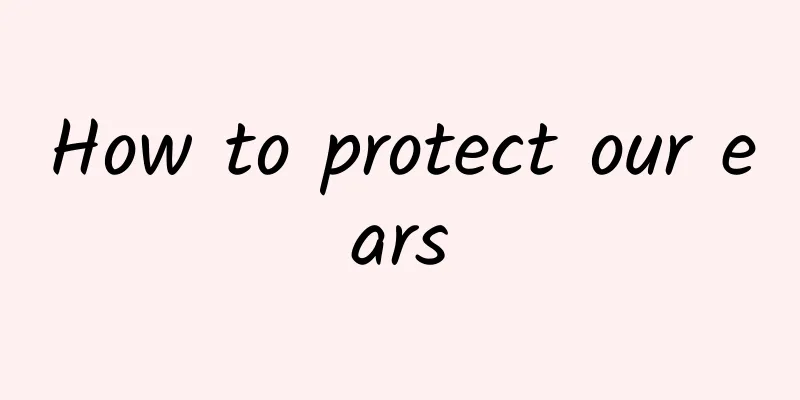How to protect our ears

|
The ear can be divided into the outer ear, middle ear and inner ear. The external ear refers to the auricle and external auditory canal, which are used to collect sound waves. The middle ear includes the eardrum, ossicular chain, tympanic cavity, and Eustachian tube, and has the functions of pressurization, energy transduction, and protection. The inner ear has semicircular canals, vestibule, and cochlea, which can maintain the body's balance, convert sound into nerve impulses, transmit sound information, and then transmit the information from the back of the cochlea to the auditory center of the cerebral cortex (auditory nerve). If any part of the ear is damaged, it may cause various diseases and seriously affect our hearing, so we must protect our ears well. Function of the ear The ear is a vital organ of hearing in the human body. It not only allows us to listen to beautiful music and the laughter of family and friends, but also plays a key role in language communication and environmental perception. At the same time, the inner ear in the ear is also involved in maintaining body balance and is indispensable for the stability of our daily activities. 1. Hearing function. We hear all the sounds from the outside world through our ears. 2. Balance function. The ear is an important organ of balance. If there is a problem with it, we will have balance disorders such as dizziness, unsteady walking, and a feeling of dizziness when lying in bed. Therefore, the ear is responsible for both your hearing and your sense of balance. If it is diseased, our hearing and balance functions will be seriously affected. Behavior that damages the ears Wearing headphones for a long time with the volume too loud: Long-term high-decibel stimulation will damage the hair cells in the inner ear. For example, many people are accustomed to wearing headphones to listen to music and TV series, and the volume often exceeds 85 decibels for a long time. This is like giving the ears "chronic poison". Over time, hearing will gradually decline. Frequent ear cleaning: The ears have a self-cleaning function. Excessive use of cotton swabs, ear picks and other tools to clean the ears can easily damage the skin of the external auditory canal, cause inflammation, and may even accidentally puncture the eardrum and affect hearing. Being in a noisy environment: If you are in a noisy environment such as a factory workshop or construction site for a long time without taking protective measures, the noise will directly impact the auditory organs and cause hearing loss. How to protect our ears 1. Prevent water ingress Prevent water from entering the ears when washing your hair or taking a bath, especially for patients with otitis media and perforated eardrums. If you feel water in your ears, you should immediately turn your ears to one side and hop on one foot to try to let the water flow out, or gently put a cotton ball or cotton swab in to absorb the water. 2. Prevent noise Loud and harsh sounds are all noise, which can damage people's hearing. Be careful to stay away from noise. When there is a sudden noise, you should cover your ears with your hands and open your mouth. Don't sleep with headphones to avoid damaging your hearing due to exposure to sound stimulation all night. 3. No ear cleaning Don't pick your ears out of boredom to avoid damaging the external auditory canal and eardrum, which may lead to secondary infection. Children should not put beans, small balls or other objects in their ears. 4. Use headphones less often Nowadays, more and more people like to listen to music with headphones, which is bad for the ears over time. In particular, high-volume audio can cause fatigue and damage to the auditory organs, leading to hearing loss and even deafness. When using personal listening devices such as smartphones, the "6-6 principle" should be followed, that is, the volume should not exceed 60% of the maximum output, and the listening time should not exceed 60 minutes each time. 5. Blow your nose correctly If you blow your nose too hard, your ears will suddenly buzz and feel a stinging pain. This is because the air pressure is too strong and penetrates the Eustachian tube connecting the middle ear cavity and the nasopharynx, causing abnormal pressure in the ear. Incorrect nose blowing methods can also lead to otitis media. 6. Use medication with caution Try to avoid the use of ototoxic drugs, such as gentamicin, streptomycin, kanamycin, neomycin, etc. These drugs can easily cause ear poisoning and thus damage hearing. In addition, hearing loss is also related to systemic diseases such as hypertension and diabetes. Negative emotions can affect the nervous system and immune function, leading to stuffy ears, stuffy ears and hearing loss. Therefore, it is necessary to control primary diseases and chronic diseases and maintain a good mood. Seek medical attention promptly if you experience tinnitus, dizziness, stuffy ears, ear pain, ear discharge, and hearing loss. |
>>: How much do parents know about nebulization?
Recommend
Anterior and posterior vaginal wall prolapse
Prolapse of the anterior and posterior walls of t...
Can I eat watermelon when I have good luck?
Women should not catch cold during their periods ...
Can pregnant women come into contact with chemotherapy patients?
It is very important for pregnant women to take g...
How can I report someone who has returned from Wuhan? Can I report a car with a Wuhan license plate number in my neighborhood?
During the Spring Festival travel rush, the numbe...
In which months of pregnancy do you usually start taking calcium supplements?
Calcium supplementation is essential during pregn...
What to do if the hymen is broken and how to repair it
Both men and women have their own thoughts and op...
How to call 120 in case of sudden illness
Calling 120 is one of the main emergency measures...
A woman with a mole on her forehead
Each of us has moles on our body, but some people...
What to do if a woman has a stomachache
In our lives, women have long been in a disadvant...
What causes women's breasts to be soft?
For women, breast health is what everyone is most...
What are the items included in the examination for ectopic pregnancy?
Nowadays, many women are worried about ectopic pr...
[Creative Cultivation Program] Can "blood washing" therapy help lose weight and lower blood lipids? Dangerous! The truth is...
When the machine starts, the garbage in the blood...
What can women eat to fill the lunula quickly?
When it comes to the half-moon, many people may n...
A 23-year-old woman suffered kidney poisoning after applying a whitening facial mask. How to determine whether there is mercury in cosmetics?
Audit expert: Zhang Yuhong Chief Physician of the...
How much do you know about fasting and drinking before surgery?
"Don't eat 8 hours before surgery!"...









